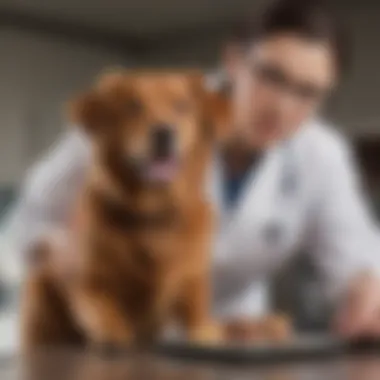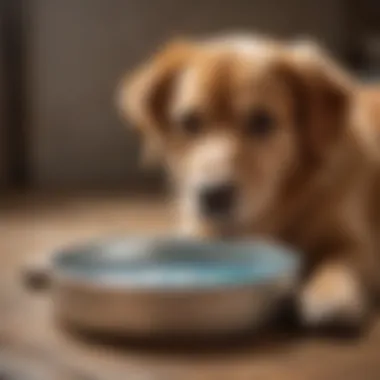Understanding Loose Bowels in Dogs: Causes, Care, and Consequences


Intro
Loose bowels in dogs can cause significant concern for pet owners. It is essential to recognize that this condition, while common, may indicate various underlying issues. Understanding the causes and consequences of loose stools can help you take appropriate care of your canine friend. This article offers a thorough exploration of the topic, including key insights that will empower pet owners to respond effectively and ensure their dogs' well-being.
Understanding Your Pet
Understanding a dog's health begins with knowledge of its breed traits, temperament, and any specific needs that may influence its digestive system. Each breed has unique characteristics that can impact its gastrointestinal health.
Breed Traits
Some dog breeds are more prone to gastrointestinal issues than others. For instance, smaller breeds like Yorkshire Terriers and Chihuahuas may experience sensitive stomachs, while larger breeds such as Great Danes may develop bloat. Understanding these traits can help in identifying potential problems early.
Common Temperaments
A dog's temperament can also influence its health. An anxious dog may experience gastrointestinal distress more easily than a calm one. Stress can trigger loose stools, making it important to monitor both physical health and emotional well-being.
Special Needs
Some dogs may have special dietary needs or health conditions that necessitate closer monitoring of their bowel movements. For instance, a dog with food allergies may react adversely to certain ingredients, leading to loose stools. Consulting with a veterinarian can provide guidance on recognizing these special needs and addressing them appropriately.
Pet Care Essentials
Pet care must encompass a balanced approach, focusing on nutrition, grooming, and overall health. The right strategies can help prevent loose bowels and promote long-term wellness.
Nutrition and Feeding Guidelines
Feeding your dog a well-balanced diet that suits its age, size, and any medical conditions is crucial. High-quality dog food can enhance digestion and reduce the chance of loose stools. Also, changes in diet should be gradual to minimize gastrointestinal upset. It might help to keep track of how certain foods affect your dog's stool consistency.
Grooming Tips and Techniques
Regular grooming supports a dog's overall health, including skin and coat quality. Long-haired breeds may require more frequent grooming to prevent matting, which can lead to skin irritation and potential digestive problems. Maintaining a clean environment can help minimize exposure to bacteria that cause stomach issues.
Health and Wellness
Regular veterinary check-ups are vital. These visits can track your dog’s health trends and catch potential issues before they escalate. Monitoring your pet for signs of distress, such as changes in appetite or energy levels, can also prompt timely intervention. If you notice persistent loose stools, it's important to consult your veterinarian.
Training and Behavior
Training and behavior management play significant roles in a dog's health. Proper training can reduce stress and anxiety, while certain activities may influence bowel health.
Basic Training Techniques
Basic commands such as “sit,” “stay,” and “come” not only promote good behavior but can also instill confidence in your dog. A confident dog is often less anxious, which can positively affect gastrointestinal health.
Behavioral Problems and Solutions
Identifying and addressing behavioral issues promptly is essential. If your dog shows signs of stress or anxiety, consider consulting a professional trainer or a veterinarian who can guide you toward effective solutions.
Mental Stimulation Activities
Engaging your dog in mental activities can keep it calm and satisfied. Puzzle toys and obedience training can provide mental enrichment, reducing anxiety and its impact on digestive health.
Engaging with Your Pet
Interaction with your pet is not only enjoyable but also vital for its emotional well-being.
Interactive Games and Toys
Interactive games can stimulate your dog both mentally and physically. Toys that challenge them can reduce boredom, which sometimes leads to anxiety-induced digestive problems.
Safe Outdoor Activities
Outdoor play is important for physical health. Taking walks and letting your dog explore different environments can provide necessary exercise while enhancing its mood.
Family-Friendly Pet Interactions
Encouraging positive interactions with family members can help strengthen the bond between your dog and the household. This can promote a sense of security and reduce anxiety, positively influencing digestive health.
Pet Adoption and Integration


Understanding loose bowels may also aid those considering bringing a new pet into their home.
Choosing the Right Pet for Your Lifestyle
Select a pet that fits your lifestyle, ensuring that you can meet its needs and manage any health issues effectively.
Preparing Your Home for a New Pet
Creating a safe and welcoming environment for a new pet is essential. This includes ensuring safe spaces for eating and relieving themselves.
Tips for Smooth Preamble
Monitor interactions between your new pet and other household members or animals. Gradual introductions can minimize stress and prevent gastrointestinal disturbances in pets during the transition period.
Proper understanding and management of your dog's health can lead to a happier life for both you and your pet. Monitoring their condition and seeking advice when needed is paramount.
Preamble to Loose Bowels in Dogs
Loose bowels in dogs is a significant health concern that warrants attention from pet owners. Understanding this issue helps owners manage their pets' digestive health better. Loose stools can indicate a range of problems, from mild dietary indiscretion to more severe health conditions. Recognizing the importance of this topic lays the groundwork for effective care strategies and intervention.
Defining Loose Bowels
Loose bowels, or diarrhea, refers to the condition where a dog's stool becomes watery and less formed. This can happen for various reasons, including sudden diet changes or reactions to certain foods. In most cases, the duration can range from a day to a few weeks. It's critical to observe the characteristics of the stools, as this information can aid in identifying the underlying cause. Pet owners should note that not all fecal changes indicate an illness; sometimes, it is simply an adjustment to a new diet or routine.
Impact on Dog Health
The impact of loose bowels on a dog’s health can be significant. Firstly, it can lead to dehydration, as loose stools cause pets to lose excessive fluids and electrolytes. This dehydration can result in serious complications if left unaddressed. Additionally, loose bowels may indicate malabsorption of nutrients, which further harms a dog's wellbeing. Malnourished pets may become lethargic and lose weight, affecting their overall health over time.
It is essential to monitor a dog's condition closely when observing loose stools, as early detection can prevent more serious health issues.
Moreover, long-term loose bowels may point to underlying gastrointestinal diseases or other medical conditions that require veterinary care. Early intervention is vital for maintaining a dog’s health and quality of life.
Common Causes of Loose Bowels
Loose bowels in dogs often stem from various factors. Understanding these causes is crucial for pet owners. When a dog's digestive system is not functioning properly, it can lead to discomfort for both the animal and its owner. Identifying the underlying reasons also enables timely interventions that can alleviate symptoms and prevent more serious health issues.
Dietary Indiscretion and Changes
Dogs are naturally curious creatures. They often ingest items that are not suitable for their digestive system. This includes food scraps, trash, or even plants. Dietary indiscretion refers to these unintentional ingestions that lead to gastrointestinal upset.
Moreover, changes in a dog's diet can also promote loose stools. Introducing new foods should be done gradually. A sudden switch might overwhelm a dog’s digestive system, creating an adverse reaction.
Food Intolerance and Allergies
Dogs can develop intolerances or allergies to certain food ingredients. Common culprits include beef, chicken, dairy, and grains. When a dog consumes something they cannot tolerate, it can result in loose stools. Recognizing these triggers is important for maintaining the health of the dog’s gastrointestinal tract. Keeping a food diary can help track which foods cause issues.
Infections and Parasites
Infections, including bacterial, viral, or parasitic infections, are significant factors that can cause loose bowels in dogs. Parasites such as giardia or roundworms invade the intestines, leading to upset stomachs and diarrhea. It is vital for dog owners to stay informed about preventive measures, like regular deworming and vaccinations, to guard against these threats.
Underlying Health Conditions
Underlying health issues can also lead to loose bowels. Understanding these conditions can help pinpoint the cause and necessary treatment. Here are three critical conditions associated with gastrointestinal upset:
Gastrointestinal Disease
Gastrointestinal diseases encompass a range of disorders affecting the stomach and intestines. They can lead to persistent loose stools, weight loss, and other symptoms. Recognizing the signs early can lead to better management of the condition. Common characteristics include chronic diarrhea and discomfort in the abdomen. Addressing gastrointestinal diseases allows pet owners to take proactive steps towards their dog's health.
Metabolic Disorders
Metabolic disorders can alter how a dog's body processes nutrients. Conditions such as diabetes can affect digestion and stool consistency. The key characteristic of these disorders is their influence on the body's metabolism. Awareness of metabolic issues is important for early diagnosis. Dogs with these disorders may require specialized diets and veterinary care, emphasizing the need for regular health check-ups.
Inflammatory Bowel Disease
Inflammatory bowel disease (IBD) is a chronic condition resulting in inflammation of the gastrointestinal tract. This leads to symptoms such as frequent loose stools, vomiting, and abdominal pain. The unique aspect of IBD is its complexity, often requiring a multidisciplinary approach to treatment. Emphasizing long-term care options will be beneficial for owners dealing with this condition.
Keeping a close eye on a dog's bowel habits can provide valuable insights into their health. Regular checks can help in early detection of issues.
Recognizing the symptoms associated with these causes allows owners to seek the right care for their furry friends. Understanding the root causes of loose bowels is essential in managing this common issue.


Symptoms Associated with Loose Bowels
Understanding the symptoms associated with loose bowels in dogs is crucial for any pet owner. Loose stools can indicate both minor and major health issues. Identifying the right symptoms helps in addressing the problem at its root and minimizing potential complications. Awareness of these signs can lead to timely interventions, which are essential for optimal health of your pet.
Identifying Loose Stools
Loose stools often present as watery, unformed, or mushy feces. A typical stool should be firm and well-shaped. If the stool lacks structure and appears more liquid, it is safe to say that the dog has loose bowels. Observing the dog's bowel habits regularly helps in catching any unusual changes early.
Monitoring the consistency of a dog's stool can provide insight into their overall health. Some situations may warrant temporary adjustments in diet. For example, a sudden change in stool consistency often calls for immediate attention.
Accompanying Symptoms to Monitor
When loose bowels occur, other symptoms may also arise. These additional signs can provide a clearer picture of the dog's health, guiding owners in determining severity and necessary actions.
Vomiting
Vomiting often accompanies digestive issues. It can indicate an underlying problem contributing to the loose stools. Not only does it serve as a physical reaction, but it can also signify distress in the gastrointestinal system. The key characteristic of vomiting is its potential to lead to dehydration and nutrient loss, which may worsen the dog's condition. Monitoring the frequency and content of vomiting is vital for understanding the overall situation.
Lethargy
Lethargy refers to the decrease in energy or activity levels. When a dog appears unusually tired or disinterested in activities, this behavior could correlate with digestive issues. The presence of lethargy suggests that the dog may not be feeling well overall. It serves as an important warning sign. Lack of energy may stem from dehydration caused by loose stools or vomiting, emphasizing the need for close observation.
Loss of Appetite
Loss of appetite is another critical symptom in dogs experiencing digestive issues. It indicates that the dog may be feeling unwell and is not consuming enough food, which can lead to further health complications. This symptom should not be ignored as it often correlates with other digestive disturbances. The absence of interest in food can contribute to weight loss and nutritional deficiencies. Owners should closely monitor their pet's eating habits and seek assistance if a loss of appetite continues for more than a day or two.
Key Points to Remember: Monitoring symptoms associated with loose bowels can aid in timely interventions. Key indicators such as vomiting, lethargy, and loss of appetite should prompt further investigation and potentially, veterinary care.
The Role of Diet in Managing Loose Bowels
Diet significantly influences a dog's gastrointestinal health. When dogs experience loose bowels, dietary adjustments can be both immediate and long-term solutions. This section delves into the specific elements that shape dietary management, addressing both the temporary and long-term strategies necessary to mitigate this issue and promote overall health.
Temporary Dietary Adjustments
In the face of loose stools, temporary dietary changes can provide relief to affected dogs. Common immediate strategies include:
- Bland Diet: Feeding a simple diet of boiled chicken and rice can help firm up stools. The easy-to-digest components are less likely to irritate the gastrointestinal tract, aiding recovery.
- Fasting: Withholding food for 12 to 24 hours allows the digestive system to rest. During this period, it's important to ensure the dog has access to clean water to avoid dehydration.
- Gradual Reintroduction of Food: After the fasting period, gradually reintroducing the regular diet can prevent reoccurrence of loose stools. Start with small portions and note if the dog tolerates the food well.
“Monitoring a dog's response to temporary dietary adjustments is essential to understand its impact on the stool quality.”
Each dog is unique, so adjustments may vary in effectiveness. Keeping a close watch on the dog’s reaction during this period is vital to identify any specific food intolerances.
Long-Term Nutritional Considerations
Managing loose bowels is not only about immediate fixes but also involves long-term nutritional planning. Proper diet choice can work wonders for a dog’s digestive health over time. Here are key considerations:
- Quality Ingredients: Selecting high-quality dog food made from easily digestible components is crucial. Foods that list meat as the first ingredient and avoid fillers can promote better digestion.
- Probiotics: Adding probiotics can support healthy gut flora. These beneficial bacteria enhance digestion and nutrient absorption, thereby reducing the likelihood of loose stools.
- Consistent Feeding Schedule: Maintaining a regular feeding schedule helps regulate digestion. Dogs thrive on routine; unexpected changes can lead to stress and digestive issues.
- Hydration: Adequate water intake is critical. Encouraging hydration not only prevents dehydration but also aids digestion and nutrient absorption.
Long-term dietary management requires awareness of the dog's specific needs. Consulting with a veterinarian can provide tailored nutrition plans, supporting sustained gastrointestinal health.
Home Remedies and Care Strategies
Navigating loose bowels in dogs often requires practical, hands-on strategies for care. Home remedies can play an essential role in the management and recovery process. These strategies not only address the immediate symptoms but also assist in preventing future episodes. Pet owners should consider various factors when implementing these remedies, ensuring they are tailored to their dog's specific needs.
Hydration and Electrolyte Balance
One of the most critical aspects of managing loose bowels is maintaining proper hydration. Dogs suffering from this condition are at a higher risk of dehydration due to frequent water loss. It is vital to provide fresh, clean water at all times.
Signs of dehydration to watch for include:
- Dry gums
- Excessive thirst
- Fatigue or lethargy
- Loss of skin elasticity
In addition to water, electrolyte solutions designed for pets can help replenish lost minerals. Products such as Pedialyte can be used, though consulting a vet beforehand is advisable. Start by offering small amounts, monitoring your dog for acceptance and tolerability. Keeping them hydrated is essential for the restoration of their health and well-being.
Probiotics and Digestive Aids
Probiotics can be beneficial in managing gastrointestinal health. They consist of live bacteria that support the natural balance within the gut. Incorporating probiotics into a dog’s diet can enhance digestive function, reducing the likelihood of future disturbances.
Consider products specifically formulated for dogs. Options include:


- Probiotic capsules
- Powdered probiotic supplements
- Probiotic-rich dog food
It's important to introduce these aids gradually to gauge your dog’s response. Regular use of probiotics may help restore beneficial gut flora, which can be disrupted during instances of loose bowels.
Monitoring Recurrences and Adjustments
Observation is key in managing loose bowels effectively. Documenting the frequency and consistency of your dog's stools can provide insight into their condition. Keeping a journal can help you note any patterns or triggers that may lead to recurrences.
You should also take note of food changes, stress factors, or environmental shifts that could contribute to gastrointestinal upset. If your dog experiences repeated episodes:
- Evaluate their diet thoroughly.
- Consider gradual introduction of new foods.
- Consult your vet for specific advice on managing identifiable triggers.
Regular monitoring can prevent chronic issues and allow for timely intervention if necessary.
When to Seek Veterinary Assistance
Understanding when to seek veterinary assistance for loose bowels in dogs is crucial for pet owners. Loose stools may indicate underlying health issues that require medical intervention. Prompt veterinary care can prevent complications such as dehydration, severe gastrointestinal disorders, or even life-threatening conditions. Knowing when to act can save pet lives and reduce long-term health costs.
Signs Indicating Urgency
There are specific signs that indicate the need for immediate veterinary attention:
- Consistent Loose Stools: If your dog's stools remain loose for more than a day, it's time to consult a vet.
- Blood in Stool: The presence of blood can be a sign of serious internal issues.
- Vomiting: Frequent vomiting alongside loose stools could lead to dehydration.
- Lethargy: If your dog appears unusually tired or unresponsive, this can be a warning signal.
- Loss of Appetite: A sudden disinterest in food is often a symptom worth reviewing.
Acting on these signs not only ensures your pet receives timely care but also helps rule out serious health conditions.
Common Diagnostic Approaches
Veterinarians use various diagnostic methods to identify the cause of loose bowels:
- Physical Examination: A thorough physical check helps identify signs of distress or pain.
- Stool Analysis: Testing the stool can reveal infections, parasites, or dietary indiscretions.
- Blood Tests: Blood tests assess organ functions and check for underlying diseases.
- Imaging: Techniques like X-rays or ultrasounds may be used to evaluate internal structures.
Overall, having a clear understanding of these diagnostic approaches can help owners prepare for a vet visit. The more information provided to the vet, the better the outcome for the dog.
Preventive Measures for Future Episodes
Preventive measures are essential when it comes to managing loose bowels in dogs. Taking proactive steps can help mitigate the occurrence of this condition, ensuring a healthier and happier life for pets. Awareness of potential triggers and committing to a routine can significantly reduce the risk of future gastrointestinal distress.
Understanding Dietary Needs
A dog's diet plays a critical role in maintaining optimal digestive health. Several factors contribute to a balanced diet, and it is important to understand these.
- Quality of Food: Always select high-quality dog food. Look for options that list a specific meat source as the first ingredient. Avoid fillers like corn and soy, which are less beneficial for digestion.
- Meal Frequency: Regular feeding schedules can help stabilize the dog's digestive system. Many veterinarians recommend feeding adult dogs twice a day instead of just once, as it can ease their digestive workload.
- Transitioning Foods: When changing a dog's diet, do so gradually. Sudden changes can upset their stomach. A good practice is to introduce new food over a week, mixing small amounts of the new food with the current food.
- Hydration: Ensure your dog has constant access to clean water. Dehydration can complicate loose bowel issues and can lead to adverse health effects.
In addition to these factors, be familiar with your dog's specific dietary needs. Consulting with a veterinarian can help tailor the diet to the individual dog's health, age, and activity level.
Regular Veterinary Check-Ups
Regular veterinary check-ups are crucial for the overall health of dogs. These appointments allow for early detection of possible health issues that may lead to loose bowels.
- Routine Examinations: Annual check-ups help monitor your dog’s health, including weight, coat condition, and digestive health.
- Vaccinations and Preventive Care: Keep up with vaccinations and preventive medications for parasites. Various intestinal parasites can lead to gastrointestinal upset.
- Health Monitoring: At each visit, discuss any recent changes in your dog's behavior, appetite, or bowel habits. This can provide the veterinarian critical insights into your dog's overall health.
Quote:
Ending: Navigating Loose Bowels in Dogs
Understanding loose bowels in dogs is crucial for both pet owners and their canine companions. This condition, while often temporary, can have serious implications if not addressed properly. An effective navigation through the symptoms and causes can lead to better health outcomes and reduced distress for both pet and owner.
In this guide, we've highlighted the key factors contributing to loose bowels, ranging from dietary indiscretion to underlying health conditions. Each cause presents its own challenges and requires different care strategies, making it essential for owners to be informed. This knowledge helps in treating the issue promptly and preventing future occurrences.
Recap of Key Points
To recap, the primary elements discussed in this article are:
- Definition: Loose bowels refer to the condition characterized by soft or watery stools.
- Common Causes: These include dietary indiscretion, food allergies, infections, and various health conditions.
- Symptoms to Monitor: Signs like lethargy and lack of appetite may accompany loose stools, necessitating immediate attention.
- Diet Management: Dietary changes can effectively manage and prevent this problem.
- Home Remedies: Ensuring hydration and considering probiotics may help in recovery.
- Veterinary Help: Knowing when to seek professional guidance is vital.
- Preventive Measures: Understanding your dog's dietary needs and maintaining regular vet visits are essential in reducing future risks.
Encouragement for Proactive Care
Pet owners should remain proactive regarding their dog's gastrointestinal health. Implementing regular dietary assessments and observing any changes in bowel habits can aid in early detection of underlying issues. Keeping a log of any incidents related to your dog’s digestion can also enhance communication with veterinarians during check-ups.
Recognizing that loose bowels can signify deeper health problems is essential. Early intervention often leads to better treatment outcomes. Being vigilant and addressing any signs of discomfort quickly can significantly improve your dog’s quality of life.
Taking responsibility for a dog's nutrition and overall health can make a big difference in preventing loose bowels. Regular veterinary check-ups and a well-balanced diet are the foundation for a healthier, happier canine companion.
Proactive monitoring and care can greatly alleviate the stress related to loose bowels in dogs.



